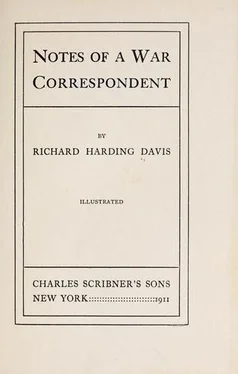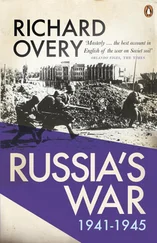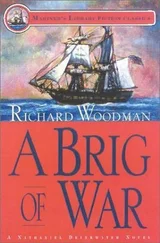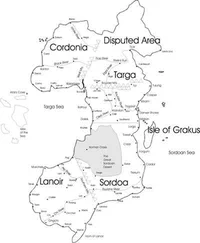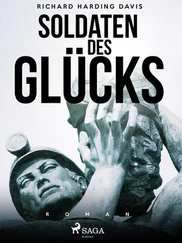Richard Davis - Notes of a War Correspondent
Здесь есть возможность читать онлайн «Richard Davis - Notes of a War Correspondent» весь текст электронной книги совершенно бесплатно (целиком полную версию без сокращений). В некоторых случаях можно слушать аудио, скачать через торрент в формате fb2 и присутствует краткое содержание. Город: New York, Год выпуска: 1911, Издательство: Charles Scribner’s Sons, Жанр: Публицистика, prose_military, на английском языке. Описание произведения, (предисловие) а так же отзывы посетителей доступны на портале библиотеки ЛибКат.
- Название:Notes of a War Correspondent
- Автор:
- Издательство:Charles Scribner’s Sons
- Жанр:
- Год:1911
- Город:New York
- ISBN:нет данных
- Рейтинг книги:5 / 5. Голосов: 1
-
Избранное:Добавить в избранное
- Отзывы:
-
Ваша оценка:
- 100
- 1
- 2
- 3
- 4
- 5
Notes of a War Correspondent: краткое содержание, описание и аннотация
Предлагаем к чтению аннотацию, описание, краткое содержание или предисловие (зависит от того, что написал сам автор книги «Notes of a War Correspondent»). Если вы не нашли необходимую информацию о книге — напишите в комментариях, мы постараемся отыскать её.
Summary by Neeru Iyer
Notes of a War Correspondent — читать онлайн бесплатно полную книгу (весь текст) целиком
Ниже представлен текст книги, разбитый по страницам. Система сохранения места последней прочитанной страницы, позволяет с удобством читать онлайн бесплатно книгу «Notes of a War Correspondent», без необходимости каждый раз заново искать на чём Вы остановились. Поставьте закладку, и сможете в любой момент перейти на страницу, на которой закончили чтение.
Интервал:
Закладка:
Of the camps of Generals Chaffee, Lawton, Bates, Sumner, and Wheeler, of Colonels Leonard Wood and Theodore Roosevelt, there are but the slightest traces. The Bloody Bend, as some call it, in the San Juan River, as some call that stream, seems to have entirely disappeared. At least, it certainly was not where it should have been, and the place the hotel guides point out to unsuspecting tourists bears not the slightest physical resemblance to that ford. In twelve years, during one of which there has been in Santiago the most severe rainfall in sixty years, the San Juan stream has carried away its banks and the trees that lined them, and the trails that should mark where the ford once crossed have so altered and so many new ones have been added, that the exact location of the once famous dressing station is now most difficult, if not impossible, to determine. To establish the sites of the old camping grounds is but little less difficult. The head-quarters of General Wheeler are easy to recognize, for the reason that the place selected was in a hollow, and the most unhealthy spot along the five miles of intrenchments. It is about thirty yards from where the road turns to rise over the ridge to Santiago, and all the water from the hill pours into it as into a rain barrel. It was here that Troop G, Third Cavalry, under Major Hardee, as it was Wheeler’s escort, was forced to bivouac, and where one-third of its number came down with fever. The camp of General Sam Sumner was some sixty yards to the right of the head-quarters of General Wheeler, on the high shoulder of the hill just above the camp of the engineers, who were on the side of the road opposite. The camps of Generals Chaffee, Lawton, Hawkins, Ludlow, and the positions and trenches taken and held by the different regiments under them one can place only relatively. One reason for this is that before our army attacked the hills all the underbrush and small trees that might conceal the advance of our men had been cleared away by the Spaniards, leaving the hill, except for the high crest, comparatively bare. To-day the hills are thick with young trees and enormous bushes. The alteration in the landscape is as marked as is the difference between ground cleared for golf and the same spot planted with corn and fruit-trees.
Of all the camps, the one that to-day bears the strongest evidences of its occupation is that of the Rough Riders. A part of the camp of that regiment, which was situated on the ridge some hundred feet from the Santiago road, was pitched under a clump of shade trees, and to-day, even after seven years, the trunks of these trees bear the names and initials of the men who camped beneath them. [4] Some of the names and initials on the trees are as follows: J. P. Allen; Lynch; Luke Steed; Happy Mack, Rough Riders; Russell; Ward; E. M. Lewis, C, 9th Cav.; Alex; E. K. T.; J. P. E.; W. N. D.; R. D. R.; I. W. S., 5th U. S.; J. M. B.; J. M. T., C, 9th.
These men will remember that when they took this hill they found that the fortifications beneath the trees were partly made from the foundations of an adobe house. The red tiles from its roof still litter the ground. These tiles and the names cut in the bark of the trees determine absolutely the site of one-half of the camp, but the other half, where stood Tiffany’s quick-firing gun and Parker’s Gatling, has been almost obliterated. The tree under which Colonel pitched his tent I could not discover, and the trenches in which he used to sit with his officers and with the officers from the regiments of the regular army are now levelled to make a kitchen-garden. Sometimes the ex-President is said to have too generously given office and promotion to the friends he made in Cuba. These men he met in the trenches were then not necessarily his friends. To-day they are not necessarily his friends. They are the men the free life of the rifle-pits enabled him to know and to understand as the settled relations of home life and peace would never have permitted. At that time none of them guessed that the “amateur colonel,” to whom they talked freely as to a comrade, would be their Commander-in-Chief. They did not suspect that he would become even the next Governor of New York, certainly not that in a few years he would be the President of the United States. So they showed themselves to him frankly, unconsciously. They criticised, argued, disagreed, and he became familiar with the views, character, and worth of each, and remembered. The seeds planted in those half-obliterated trenches have borne greater results than ever will the kitchen-garden.
The kitchen-garden is immediately on the crest of the hill, and near it a Cuban farmer has built a shack of mud and twigs and cultivated several acres of land. On Kettle Hill there are three more such shacks, and over all the hills the new tenants have strung stout barbed-wire fences and made new trails and reared wooden gateways. It was curious to find how greatly these modern improvements confused one’s recollection of the landscape, and it was interesting, also, to find how the presence on the hills of 12,000 men and the excitement of the time magnified distances and disarranged the landscape.
During the fight I walked along a portion of the Santiago road, and for many years I always have thought of that walk as extending over immense distances. It started from the top of San Juan Hill beside the block-house, where I had climbed to watch our artillery in action. By a mistake, the artillery had been sent there, and it remained exposed on the crest only about three minutes. During that brief moment the black powder it burned drew upon it the fire of every rifle in the Spanish line. To load his piece, each of our men was forced to crawl to it on his stomach, rise on one elbow in order to shove in the shell and lock the breech, and then, still flat on the ground, wriggle below the crest. In the three minutes three men were wounded and two killed; and the guns were withdrawn. I also withdrew. I withdrew first. Indeed, all that happened after the first three seconds of those three minutes is hearsay, for I was in the Santiago road at the foot of the hill and retreating briskly. This road also was under a cross-fire, which made it stretch in either direction to an interminable distance. I remember a government teamster driving a Studebaker wagon filled with ammunition coming up at a gallop out of this interminable distance and seeking shelter against the base of the hill. Seated beside him was a small boy, freckled and sunburned, a stowaway from one of the transports. He was grandly happy and excited, and his only fear was that he was not “under fire.” From our coign of safety, with our backs to the hill, the teamster and I assured him that, on that point, he need feel no morbid doubt. But until a bullet embedded itself in the blue board of the wagon he was not convinced. Then with his jack-knife he dug it out and shouted with pleasure. “I guess the folks will have to believe I was in a battle now,” he said. That coign of safety ceasing to be a coign of safety caused us to move on in search of another, and I came upon Sergeant Borrowe blocking the road with his dynamite gun. He and his brother and three regulars were busily correcting a hitch in its mechanism. An officer carrying an order along the line halted his sweating horse and gazed at the strange gun with professional knowledge.
“That must be the dynamite gun I have heard so much about,” he shouted. Borrowe saluted and shouted assent. The officer, greatly interested, forgot his errand.
“I’d like to see you fire it once,” he said eagerly. Borrowe, delighted at the chance to exhibit his toy to a professional soldier, beamed with equal eagerness.
“In just a moment, sir,” he said; “this shell seems to have jammed a bit.” The officer, for the first time seeing the shell stuck in the breech, hurriedly gathered up his reins. He seemed to be losing interest. With elaborate carelessness I began to edge off down the road.
Читать дальшеИнтервал:
Закладка:
Похожие книги на «Notes of a War Correspondent»
Представляем Вашему вниманию похожие книги на «Notes of a War Correspondent» списком для выбора. Мы отобрали схожую по названию и смыслу литературу в надежде предоставить читателям больше вариантов отыскать новые, интересные, ещё непрочитанные произведения.
Обсуждение, отзывы о книге «Notes of a War Correspondent» и просто собственные мнения читателей. Оставьте ваши комментарии, напишите, что Вы думаете о произведении, его смысле или главных героях. Укажите что конкретно понравилось, а что нет, и почему Вы так считаете.
